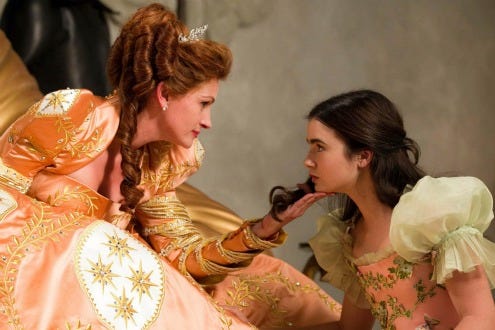Mirror, Mirror

There was nothing about "Mirror, Mirror" that I hated, but there was also nothing that I really loved. I like the idea but am largely indifferent to the movie that came of it.
Director Tarsem Singh Dhandwar and screenwriters Melissa Wallack and Jason Keller seem to have set out to make a dizzyingly funny, satirical take on the classic "Snow White" fable by the Brothers Grimm. But the film repeatedly steps back from pure comedy and goes for amusing and charming. You can almost hear the studio honchos whispering in their ear, "Remember the 18-35 female demographic."
The tone is less "Monty Python and the Holy Grail" and more "Ella Enchanted." I think they should have given up on the sweet, mushy parts and gone for the Full Gilliam. Actually, I'm sort of piqued to see what Terry Gilliam could have done with this material and budget.
As you probably know, this is the first of two Snow White adaptations arriving in theaters this year. Later we get the dark-and-scary version, "Snow White and the Huntsman," where Snow gets into knife fights and wears more grime than ball gowns. Personally, I was much more looking forward to this one.
Julia Roberts plays the evil queen and serves as narrator, telling us right from the start that this is her story, not Snow's. That's not really true, but it should have been; Roberts is easily the best thing about the movie. Instead of the whole cruel-and-evil stepmother gig, Roberts plays the queen as an over-spoiled movie star, toying with her vassals and using her vast powers to keep herself sitting pretty. She doesn't so much like ruling the kingdom as being the center of attention.
By contrast, Snow is a drab and flat character. As played by Lilly Collins, she's a castle shut-in who yearns for her long-lost father, who married the queen and then disappeared chasing a mythical beast in the forest. For a post-feminist princess, she's rather passive, only taking action after various male figures urge her to take up arms.
The prince here is Alcott, played by Armie Hammer as a vainglorious but good-hearted guy who gets caught between Snow and the queen. The queen wants to marry him and claim his vast wealth to refill her kingdom's empty coffers, but Alcott seems totally unaware of her erstwhile ardor. He's smitten by Snow instead, but then she disappears and takes up with the Dwarves.
The minimalist seven are a hoot, and the filmmakers actually manage to imbue each of them with some distinct personality. Danny Woodburn plays Grimm, the world-weary leader. Martin Klebba is Butcher, who's hardcore and wears a cowboy hat. Grub (Joe Gnoffo) is a big eater, Chuckles (Ronald Lee Clark) is a giggler and Wolf (Sebastian Saraceno) is the bruiser. Jordan Prentice adds a little soul as Napoleon, and Half Pint (Mark Povinelli) has an amusing, unrequited crush on Snow.
The dwarves in this iteration are itinerant highwaymen who live in the forest and rob travelers. They wear funky stilts that can expand and retract like accordions, turning them into giants who leap and twist about like Cirque du Soleil performers gone medieval.
The movie's version of the magic mirror is strange and a little confusing. Instead of it being a mirror in her castle with a face that the queen converses with, she steps through a mirror into another dimension. She surfaces on a giant lake or ocean where some wooden huts have been built. Inside is the mirror with the magical spirit who is her servant but looks like her own reflection — though without any wrinkles, it wryly notes.
"They're not wrinkles! They're ... crinkles," the queen pouts adorably. One of the running jokes is that the queen is in denial about her own aging — she insistently tells the prince that he and she are "about the same age" — and kudos to Roberts for bravely tweaking her fading ingenue status.
So Snow joins up with the dwarves, becoming a thief, though a good-hearted one who returns the people's taxes to them. As is the staple in these sorts of movies, she also manages to become an expert swordsman over the course of a single musical interlude and montage.
My biggest problem with "Mirror, Mirror" is that it contained no surprises for me. Once you've established the slightly fractured take on the fairy tale — which one can get just from watching the trailer — all the story elements and character arcs fall neatly and predictably into place. Even the oft-referenced Beast in the forest contained no secrets, as I guessed his final disposition before I ever even saw him.
"Mirror, Mirror" certainly isn't a bad movie, and there are a few wickedly funny moments and glimpses of inspired characterizations. Alas, this spell only works sporadically.



